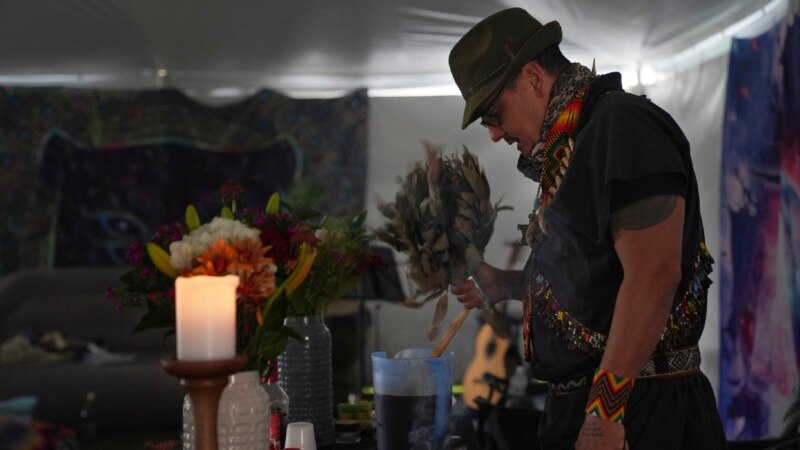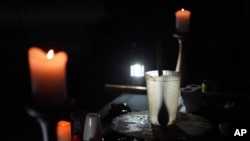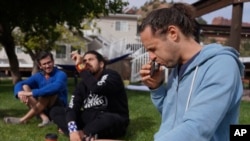This website uses cookies so that we can provide you with the best user experience possible. Cookie information is stored in your browser and performs functions such as recognising you when you return to our website and helping our team to understand which sections of the website you find most interesting and useful.

The tea tasted bitter and earthy, but Lorenzo Gonzales drank it anyway. On that night in remote Utah, he was hoping for a life-changing experience, which is how he found himself inside a tent with two dozen others waiting for the psychedelic brew known as ayahuasca to kick in.
Soon, the gentle sounds of a guitar were drowned out by people vomiting — a common downside of the drug.
Gonzales started howling, sobbing, laughing and repeatedly babbling. Facilitators from Hummingbird Church placed him face down, calming him momentarily before he started laughing again and crawling.
"I seen these dark veins come up in this big red light, and then I seen this image of the devil," Gonzales said later. He had quieted only when his wife, Flor, touched his shoulder and prayed.
His journey to this town along the Arizona-Utah border is part of a growing global trend of people turning to ayahuasca to treat an array of health problems after conventional medications and therapy failed. Their problems include eating disorders, depression, substance use disorders and PTSD.
The rising demand for ayahuasca has led to hundreds of churches like this one, which advocates say are protected from prosecution by a 2006 U.S. Supreme Court ruling. In that case, a New Mexico branch of a Brazilian-based ayahuasca church won the right to use the drug as a sacrament — even though its active ingredient remains illegal under U.S. federal law. A subsequent lower court decision ruled Oregon branches of a different ayahuasca church could use it.
"In every major city in the United States, every weekend, there's multiple ayahuasca ceremonies," said Sean McAllister, who represents an Arizona church in a lawsuit against the federal government after its ayahuasca from Peru was seized at the port of Los Angeles.
The pro-psychedelics movement's growth has sparked concerns of a government crackdown. In addition to ayahuasca shipments being seized, some churches stopped operating over fears of prosecution. There are also concerns these unregulated ceremonies might pose a danger for some participants and that the benefits of ayahuasca haven't been well studied.
It was dark as the Hummingbird ceremony began on a Friday night in October, except for flickering candles and the orange glow of heaters. Psychedelic art hung from the walls; statues of the Virgin Mary and Mother Earth were positioned near a makeshift altar.
Participants sat in silence, waiting for Taita Pedro Davila, the Colombian shaman and traditional healer who oversaw the ceremony.
A mix of military veterans, corporate executives, thrill seekers, ex-members of a polygamous sect and a man who struck it rich on a game show had turned up for the $900 weekend. Many appeared apprehensive yet giddy to begin the first of three ceremonies.
The brew contains an Amazon rainforest shrub with the active ingredient N, N-Dimethyltryptamine, or DMT, and a vine containing alkaloids that prevents the drug from breaking down in the body.
Those who drink ayahuasca report seeing shapes and colors and going on wild, sometimes terrifying journeys that can last hours. In this dreamlike state, some say they encounter dead relatives, friends and spirits.
"You were invited for a weekend of healing," Davila told the group, before people lined up for their tea.
Locking eyes with each participant, Davila uttered a prayer over the cups before blowing on them with a whistling sound and handing them over to drink.
Gonzales and his wife, Flor, were among the ayahuasca newcomers.
They had driven from California, hoping for relief for 50-year-old Gonzales. He'd battled drug addiction for much of his life, was suffering the effects of COVID-19 and had been diagnosed with early stage dementia.
"My poor body is dying and I don't want it to die," said Gonzales, who rarely sleeps and is prone to fits of anger.
Maeleene Jessop was also a newcomer but grew up in Hildale, the Utah town where the ceremony was held. She is a former member of the Fundamentalist Church of Jesus Christ of Latter Day Saints, or FLDS, a polygamist offshoot of The Church of Jesus Christ of Latter-day Saints.
Hildale was the group's stronghold. The ceremony was held in a tent on the grounds of a house once owned by a former FLDS member.
Jessop, 35, left the church after its leader, Warren Jeffs, was arrested for sexually assaulting girls he considered brides. He is serving a life sentence in federal prison. Jessop has struggled to adapt to her new life, battling depression and haunted by the physical and sexual abuse she endured as a child.
The roots of ayahuasca go back hundreds of years to ceremonial use by Indigenous groups in the Amazon. In the past century, churches have emerged in several South American countries where ayahuasca is legal.
The movement found a foothold in the United States in the 1980s and interest has intensified more recently as celebrities like NFL quarterback Aaron Rodgers and Hollywood actor Will Smit h talked about attending ceremonies.
Some spend thousands of dollars to attend five-star ayahuasca retreats in the Amazon. But in the U.S., the movement remains largely underground, promoted by social media and word of mouth, with ceremonies held in supporters' homes, Airbnb rentals and remote areas to avoid law enforcement scrutiny.
Like many of these, Hummingbird won't be mistaken for a traditional Western church.
It has no written text and relies primarily on Davila's prayers, chants and songs to guide participants through the ceremony. Davila follows traditions learned from his grandfather.
Courtney Close, Hummingbird's founder who credits ayahuasca with helping her overcome cocaine addiction and postpartum depression, believes the designation as a church helps show that participants are "doing this for religious reasons." But when it comes to defining it as a religion, Close stressed that depends on individual participants' experience.
"We just try to create a spiritual experience without any dogma and just let people experience God for themselves," she said.
Back in California, Flor Gonzales is convinced ayahuasca is behind her husband's improvement. "I just feel like we have a future," she said.



 Africana55 Radio
Africana55 Radio 


